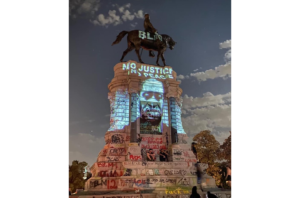What distinguishes Baal from YHVH? When it comes to names of divinities found throughout the Tanakh, there are certain ones that are acceptable while others are disparaged. Even if we accept that our ancestors were simply asserting their monotheism (or monolatry) by denying the authority of these other deities, there is another important motive to consider. What our prophets of yore found outrageous and depraved in their day, that ruined the names of major divinities of cults they were familiar with, were the rituals by which these divinites were honored — and which established systemic injustice in consecrated acts of extreme violence and brutality. In ancient times, as in our own times, monuments were erected to establish and communicate and self-validate the authority of the powers that be and the system by which their power was asserted. Today, if the powers that be don’t explicitly claim divine authority, should we then allow ourselves to be fooled that the power and prominence being commemorated is anything less than an assertion of divine fiat (or popular consensus!)? The simpleminded argument that “statues preserve our heritage” is not one that we should tolerate as part of a wider community of justice seekers determining what in our heritage needs preservation and how it should be commemorated. Our concern is especially underscored when we find in our public parks and institutions statues celebrating the perpetrators of horrible atrocities, monuments which boldly if silently normalize systemic injustices which should have long ago been already uprooted. So, here’s a service for those interested in fulfilling the Biblical commandment of destroying idolatrous statues. #BLM –Aharon N. Varady & Isaac Gantwerk Mayer
Note: “The CAUSE” is used to translate the Divine Name YHVH, based on the philosophical idea of God as the Prime Mover and on the interpretation of the Name as a causative form of the copula – “causes to be.”
| Source (Hebrew) | Translation (English) |
|---|---|
לְשֵׁם יִחוּד קוּדְשָׁא בְּרִיךְ הוּא וּשְׁכִינְתֵּיהּ, בִּדְחִילוּ וּרְחִימוּ וּרְחִימוּ וּדְחִילוּ, לְיַחֲדָא שֵׁם יוֹ״ד הֵ״י בְּוָא״ו הֵ״י בְּיִחוּדָא שְׁלִים וּבְשֵׁם כׇּל־יִשְׂרָאֵל, הִנְנִי מוּכָן וּמְזֻמָּן (נק׳ מוּכֶנֶת וּמְזֻמֶּנֶת) לְקַיֵּם מִצְוַת עֲשֵׂה שֶׁצִּוָּנוּ הַבּוֹרֵא יִתְבָּרַךְ, לְאַבֵּד עֲבוֹדָה זָרָה וּמְשַׁמְּשֶׁיהָ, כְּמוֹ שֶׁכָּתוּב בְּתוֹרָתֶךָ — וְנִתַּצְתֶּ֣ם אֶת־מִזְבְּחֹתָ֗ם וְשִׁבַּרְתֶּם֙ אֶת־מַצֵּ֣בֹתָ֔ם וַאֲשֵֽׁרֵיהֶם֙ תִּשְׂרְפ֣וּן בָּאֵ֔שׁ וּפְסִילֵ֥י אֱלֹֽהֵיהֶ֖ם תְּגַדֵּע֑וּן וְאִבַּדְתֶּ֣ם אֶת־שְׁמָ֔ם מִן־הַמָּק֖וֹם הַהֽוּא׃ (דברים יב:ג) |
For the sake of the unity of the blessed Holy One and the divine Presence, in awe and love, and in love and awe, to unify the Name Yod Hei with Waw Hei in total unity, and for the sake of all Israel, behold I am willing and prepared to fulfill the obligatory commandment that the blessed Creator commanded us, to destroy idolatry and its tools, as written in Your Teaching: And you will overthrow their altars, and shatter their pillars, and put their sacred posts to the fire, and the statues of their gods cut down, and destroy their name from the place.[1] Deuteronomy 12:3. |
בְּשִׁירֵי דָּוִד עַבְדְּךָ מְשִׁיחֶךָ כָּתוּב לֵאמֹר— עֲֽ֭צַבֵּיהֶם כֶּ֣סֶף וְזָהָ֑ב מַ֝עֲשֵׂ֗ה יְדֵ֣י אָדָֽם׃ פֶּֽה־לָ֭הֶם וְלֹ֣א יְדַבֵּ֑רוּ עֵינַ֥יִם לָ֝הֶ֗ם וְלֹ֣א יִרְאֽוּ׃ אׇזְנַ֣יִם לָ֭הֶם וְלֹ֣א יִשְׁמָ֑עוּ אַ֥ף לָ֝הֶ֗ם וְלֹ֣א יְרִיחֽוּן׃ יְדֵיהֶ֤ם ׀ וְלֹ֬א יְמִישׁ֗וּן רַ֭גְלֵיהֶם וְלֹ֣א יְהַלֵּ֑כוּ לֹא־יֶ֝הְגּ֗וּ בִּגְרוֹנָֽם׃ כְּ֭מוֹהֶם יִהְי֣וּ עֹשֵׂיהֶ֑ם כֹּ֖ל אֲשֶׁר־בֹּטֵ֣חַ בָּהֶֽם׃ (תהלים קטו:ד-ח) |
In the songs of David Your servant it is written, quote: Their idols are silver and gold, works of human hand. A mouth they have but speak not, eyes they have but see not. Ears they have but hear not, a nose they have but breathe not. Hands but touch not, their feet walk not, No muttering in their throat. Like them will be their makers, all who trust in them.[2] Psalms 115:4-8. |
וּבִדְבָרִי יִרְמְיָהוּ נְבִיא מֻקְדָּשֶׁךָ נֶאֱמַר— נִבְעַ֤ר כׇּל־אָדָם֙ מִדַּ֔עַת הֹבִ֥ישׁ כׇּל־צוֹרֵ֖ף מִפָּ֑סֶל כִּ֛י שֶׁ֥קֶר נִסְכּ֖וֹ וְלֹא־ר֥וּחַ בָּֽם׃ הֶ֣בֶל הֵ֔מָּה מַעֲשֵׂ֖ה תַּעְתֻּעִ֑ים בְּעֵ֥ת פְּקֻדָּתָ֖ם יֹאבֵֽדוּ׃ (ירמיהו י:יד-טו) |
And in the words of Jeremiah Your sanctified prophet it is said: Every man is bereft of knowledge, every goldsmith ashamed of the statue, for a lie is its mold, and no breath is in them. They are wasted breath, a matter of delusion; in their time of account they will be destroyed.[3] Jeremiah 10:14-15. |
בָּרוּךְ אַתָּה יְהֹוָה אֱלֹהֵינוּ מֶלֶךְ הָעוֹלָם אֲשֶׁר קִדְּשָׁנוּ בְּמִצְוֹתָיו וְצִוָּנוּ לַעֲקֹר עֲבוֹדָה זָרָה מֵאַרְצֵנוּ׃ (מהרש״א על ברכות נז׳ ב) |
Blessed are You, CAUSE our God, Sovereign of the Universe, who sanctified us with commandments and commanded us to uproot idolatry from our land.[4] Maharsh”a, Chidushei Agadot on Berakhot 57b. |
כאן הפסל נשבר |
Here the statue is broken. |
וּכְשֵׁם שֶׁנֶּעֶקְרָה מִמָּקוֹם זֶה כֵּן תֵּעָקֵר מִכׇּל־מְקוֹמוֹת יִשְׂרָאֵל וְהָשֵׁב לֵב עוֹבְדֵיהֶם לְעׇבְדֶךָ׃ (ברכות נז׳ ב) |
And just as it was uprooted from this place, so too may You uproot it from all the places of Israel, and turn its servants to serve You.[5] Berakhot 57b. |
וְיִזְנְחוּ אֶת עֲצַבֵּיהֶם (וְיִתְּנוּ לְךָ כֶּתֶר מְלוּכָה) וְיַחְפְּרוּ עִם פְּסִילֵיהֶם (וְיִתְּנוּ לְךָ כֶּתֶר מְלוּכָה) וְיַטּוּ שְׁכֶם אֶחָד לְעָבְדֶךָ (וְיִתְּנוּ לְךָ כֶּתֶר מְלוּכָה) |
And they will abandon their idols (and grant You a royal crown) And be embarrassed by their statues (and grant You a royal crown) And will incline a shoulder to serve You (and grant You a royal crown)[6] The piyyut ויאתיו (V’ye’etayu), found in of the High Holy Days Musaf. |
יִ֭שְׂרָאֵל בְּטַ֣ח בַּיהֹוָ֑ה עֶזְרָ֖ם וּמָגִנָּ֣ם הֽוּא׃ בֵּ֣ית אַ֭הֲרֹן בִּטְח֣וּ בַיהֹוָ֑ה עֶזְרָ֖ם וּמָגִנָּ֣ם הֽוּא׃ יִרְאֵ֣י יְ֭הֹוָה בִּטְח֣וּ בַיהֹוָ֑ה עֶזְרָ֖ם וּמָגִנָּ֣ם הֽוּא׃ (תהלים קטו:ט-יא) |
Israel, trust in the CAUSE, who is their help and shield. Aharonides, trust in the CAUSE, who is their help and shield. God-fearers, trust in the CAUSE, who is their help and shield.[7] Psalm 115:9-11. |
לְחַיִּים וְלֹא לַמָּוֶת! (אָמֵן) לְכָבוֹד וְלֹא לְבֹשֶׁת! (אָמֵן) לְשָׁלוֹם וְלֹא לִמְרִיבָה! (אָמֵן) לְאַהֲבָה וְלֹא לְשִׂנְאָה! (אָמֵן) לַחֵרוּת וְלֹא לְעַבְדוּת! (אָמֵן) |
To life and not to death! Amen! To honor and not to shame! Amen! To peace and not to strife! Amen! To love and not to hate! Amen! To freedom and not to slavery! Amen! |
Notes

“סדר לאבד פסלי עבודה זרה | Service for Destroying Idolatrous Statues, by Isaac Gantwerk Mayer (2020)” is shared through the Open Siddur Project with a Creative Commons Attribution-ShareAlike 4.0 International copyleft license.










Leave a Reply